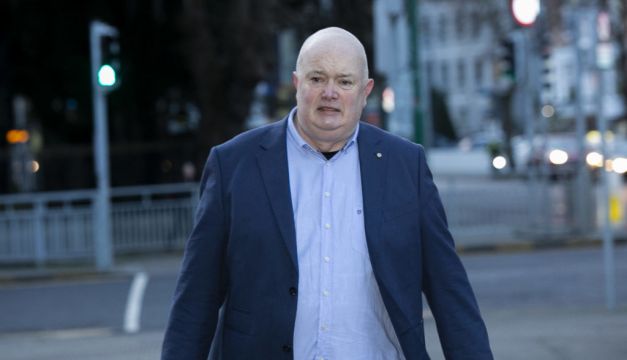An Garda Síochána has been ordered to pay €65,000 compensation to a Garda sergeant based in Co Cork for discriminating against him on the grounds of disability.
The Workplace Relations Commission (WRC) found that An Garda Síochána discriminated against Sgt David Haughney, who was described as a "highly respected and valued" member, for failing to provide him "reasonable accommodation" for a disability under the Employment Equality Act.
Sgt Haughney’s disability arose after he was the victim of an assault in December 2014 where he lost 70 per cent of his vision in his left eye.
WRC adjudicator Jim Dolan said the impact of the assault had life-changing effects on Sgt Haughney, who joined the force in 1990.
In his findings, Mr Dolan stated that the discrimination against Sgt Haughney by failing to give him reasonable accommodation for his disability went further than this.
Mr Dolan stated that on Sgt Haughney's first return to work, accommodations were provided to him by three different superintendents.
However, Mr Dolan found that these accommodations were withdrawn by Supt Adrian Gamble at Midleton Garda station on the second return to work, with Mr Dolan commenting that "treating similar situations differently can give rise to discrimination".
Mr Dolan stated that although not legally required to do so, Supt Gamble should have consulted with Sgt Haughney before deciding what he could and could not do.
Functions
Sgt Haughney stated that in addition to road policing duties, Sgt Haughney was a Public Order instructor, a handcuffs instructor, a Tac advisor and an evidence gatherer.
Sgt Haughney carried out these functions as an instructor/trainer as well as co-ordinating and developing training programmes.
After being deemed fit to return to duties in November 2015 following the December 2014 assault, Sgt Haughney continued to be involved in the training programmes and was subsequently appointed as a Public Order trainer.
Sgt Haughney continued with the support of his then superintendents, John Quilter and Eamon O’Neill, to carry out his responsibilities and duties with the same degree of competence as before the December 2014 assault.
In April 2019, Sgt Haughney underwent a further operation to his left eye concerning a detached retina, which resulted in him being absent from work for four months.
On his return to work, in a meeting in October 2019, Supt Gamble referred to a report from the chief medical officer which stated Sgt Haughney should be restricted to non-confrontational duties.
As a result, Sgt Haughney was informed that he was no longer permitted to engage in any driving or training, or present himself in public in uniform.
This is the point at which the alleged discrimination commenced, and on October 6th, 2019, Sgt Haughney was moved to a traffic office which effectively confined him to an isolated office, separate to the main building and his colleagues.
The degree of isolation from colleagues and regular duties had a significant impact on Sgt Haughney’s health and well-being, the WRC heard.
Sgt Haughney was represented in the case by Michael Hegarty and Siobhan Lafferty, of Reddy Charlton Solicitors, and they alleged that Supt Gamble repeatedly prevented Sgt Haughney from engaging in any meaningful role in the force allegedly under the guise of his concern for Sgt Haughney’s welfare.
Transfer
Sgt Haughney was absent from work on sick leave due to work related stress from July 18th, 2020, to January 22nd, 2021, as a result of the impact the discrimination was having on him.
Sgt Haughney transferred to Ballincollig Garda Station in September 2021, which is an additional 68km round trip from his home, on the understanding that he would be allowed to carry out public order training and related duties.
Sgt Haughney’s legal representatives argued that their client’s role had been reduced to that of a ceremonial role because he was not allowed to take part in any meaningful role, including training for which he is highly qualified.
This was despite the fact that Sgt Haughney had made several attempts to return to duties, in line with medical recommendations, which had been denied, resulting in ongoing distress and hardship to his well-being.
At the WRC hearing, Sgt Haughney’s wife, Denise Coleman, who is also a Garda member, provided "some useful information" about the extent of her husband's efforts to become fit enough to return to his work.
Giving evidence of behalf of Sgt Haughney, retired Garda Inspector Owen Healy described Sgt Haughney as one of the most experienced gardaí in the region of Kerry, Cork and Limerick.
Also giving evidence on behalf of Sgt Haughney, retired Garda Inspector Joseph O’Connor said he attended the October 2019 return-to-work meeting between Supt Gamble and Sgt Haughney, and described Supt Gamble’s attitude as "hostile", adding that he thought it was going to become confrontational on the part of Supt Gamble.
In denying the discrimination, An Garda Síochána stated Sgt Haughney’s commitment to his duties has been unwavering, for which he was to be commended.
However, the force argued the duties to which Sgt Haughney was assigned were duties that were entirely consistent with the occupational health advice that Sgt Haughney was to undertake strictly non-confrontational duties.
Represented by Declan Harmon BL, instructed by Lorraine Williams of the Chief State Solicitor's Office, An Garda Síochána further submitted that Supt Gamble, as the local manager, had full regard to every aspect of the matter and assigned Sgt Haughney to strictly non-confrontational duties that were meaningful, operationally important and fully consistent with duties that a person of Sgt Haughney’s rank would be expected to perform.
The force also denied that Sgt Haughney was located in an isolated office at Midleton Garda station.
In evidence, Dr Richard Quigley, from the office of the chief medical officer, under cross-examination from Mr Dolan, replied "yes" when asked whether the conditions for Sgt Haughney’s return to work in December 2015 were the same in August 2019.
An Garda Síochána has been contacted for comment on the ruling, and whether it intends to appeal the outcome to the Labour Court.







